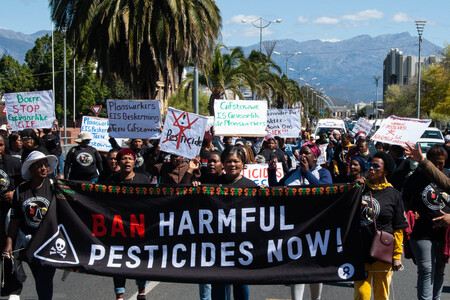*[Campaign Update]: Women on Farms Project welcomes the cabinet's decision to ban Terbufos and its importation into the country following the deaths of 6 children in Soweto. This is a step in the right direction and an indication that banning harmful pesticides is possible. Read more here: https://www.ewn.co.za/2025/06/17/women-on-farms-project-welcome-ban-on-terbufos * [Campaign update]: on the 04th of February, the South African Human Rights Commission (SAHRC) met with the Portfolio Committee on Agriculture and the Department of Agriculture in parliament to highlight the grave concerns over the human rights impact on the use of Terbufos and similar pesticides, on the rights to food, bodily integrity and life. It was noted that Terfubos, in particular, and other (HHPs) in general, could be banned immediately if alternatives were available. Read the statement here.
Last year in December, the African Centre for Biodiversity (ACB) alongside a coalition of organisations, academics, and unions, submitted a letter of demand to the Minister of Agriculture, Steenhuisen, calling for the immediate ban of Terbufos, the pesticide implicated in the tragic deaths of six children in Soweto last year. The Dept. of Agriculture has until the 28th of February 2025 to respond to the demands, and failure to do so will result in legal action being taken. Read more here. In 2019, the Women on Farms Project (WFP) launched its Double Standards Pesticides Campaign, which initially targeted the South African government, demanding that it ban 67 Highly Hazardous Pesticides (HHPs) already banned in the European Union. The EU continues to produce and export many HHPs to South Africa, even though these pesticides are banned for use on their own soil due to their harmful effects on human health.
In 2022, the Department of Agriculture announced its plans to ban certain HHPs by 1 June 2024. However, the most dangerous of these pesticides have still not been banned and are still widely used on commercial farms, causing respiratory problems, skin irritations, genetic mutations, cancer, damage to the reproductive system, and even death, in exposed groups like farm workers and dwellers.
.png)

